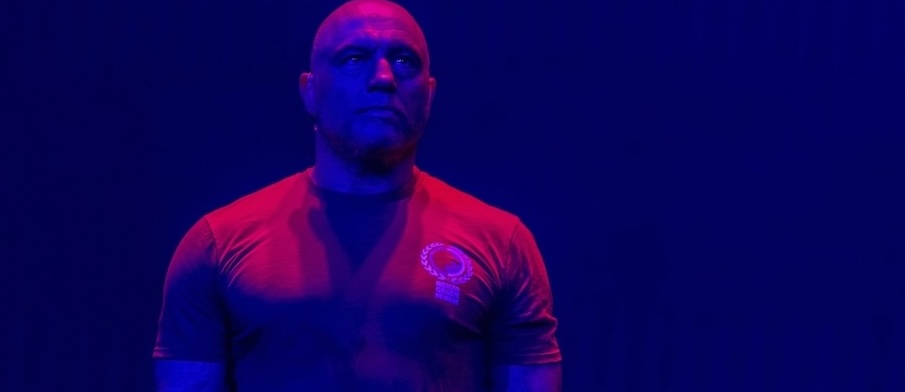When British author Douglas Murray debated comedian Dave Smith and podcaster Joe Rogan on the latter’s show, many in the audience expressed frustration that Murray didn’t make certain points in defense of Israel he’s made in the past and could easily have brought up again. Yet the Brit didn’t need to hammer every nail—he destroyed the duo regardless. He went for the bigger prize: the direction of the conservative movement.
In the run-up to the 2024 election, Rogan fashioned himself into a kingmaker, doing marathon interviews with Donald Trump and J.D. Vance. Back then, right-wing pundits praised Rogan and championed podcasts as a superior media format: Because of their length they allow in-depth exploration of topics and thereby flush out superficiality and bias. Kamala Harris, the argument went, couldn’t do a long-form interview, not because she was notoriously tongue-tied or lacked personality, but because she had no substance.
Then Murray shuttered the blind faith in podcasts. He pressed Rogan on his editorial choices—platforming anti-Semites like Smith who, despite his year-and-a-half obsession with Israel, could not be bothered to visit the Jewish state, and one Darryl Cooper. Cooper is a 100,000-follower Substack influencer whom the former Fox News star Tucker Carlson once described as “maybe the best and most honest popular historian in the United States.”
Pursuing his “popular historian” MO, Cooper repackages Holocaust revisionism, claiming that Winston Churchill was “the chief villain of the Second World War” and that Hitler sought peace and stumbled on the Holocaust by accident. Those ideas were immediately debunked following his heavily promoted appearance on Tucker.
It’s easy to be wrong when you’re no expert. There is no indication that the social media denizen speaks any foreign languages or has worked in an archive or read the hundreds, if not thousands of titles in his field—as expected from a professional historian. What he lacks in depth and breadth, the influencer makes up in conviction. On his Twitter/X account, the “popular historian” promotes neo-Nazi merchandise, imagines Hitler in heaven, and celebrates the Roman genocide and disbursement of the Jewish people in antiquity.
That in recent months Rogan has featured these two, and several other, anti-Semitic figureheads and allowed them to spread their ideas without much pushback was Murray’s key point—and his host had nothing to say in his own defense. Sore Rogan fans had to explain away Murray’s successful performance, so they accused the smart kid of snootiness (with Rogan himself indulging post-interview in a childish impression of Murray’s British accent). Can you believe the elitist Murray is defending credentialism? What other explanation is there for evoking professional standards?
To be fair, our expert class deserves every last drop of disdain it gets—for pushing racialism, for the quarter century of imminent climate Armageddon hype, for putting the country under house arrest owing to an errant virus it insisted was not the product of a lab in China, for insisting that men can be women. That’s a very brief list of outright delusions the credentialed pushed into the mainstream.
Educated people of all political leanings—and I mean all, think of the liberal Camille Paglia, for instance—have long insisted that there is nothing sacred about a college degree or that many people can do journalism. Two decades ago, conservative and libertarian bloggers took pride in being “guys in their living rooms and their pajamas,” as one network pundit once dismissively remarked. But most bloggers came from professional backgrounds—lawyers, professors, and so on—and have strong research skills. To my knowledge, no blogger objected to the conventions of academic or journalistic inquiry. Instead, they were incensed with corruption in American institutions and want the credentialed class to live up to the agreed-upon models of conduct.
Back in 2008, PJ Media brought out Joe the Plumber, a working-class guy who went viral after confronting Barack Obama on the campaign trail, sending him to do citizens journalism. I am very sympathetic to the idea of citizen journalism, but Joe was handed a challenging assignment, and without proper initiation he fell flat on his face. And that was somebody obviously smart, a smooth talker. He just wasn’t prepared for the mission.
Conventions of the journalist practice have developed over centuries. Historiography is older than that; in fact, it dates back to antiquity. The methodology of these fields has been contested and evolved over the course of generations—and exists for a reason.
My academic background happened to be in folklore, and amateurs are easy to spot. Folklore attracts them, too, because everyone read fairy tales as a kid and having opinions about them feels natural. But we shake our heads at all the takes on how Charles Perrault’s Cinderella represents the worldview of the French peasantry under the ancien régime, when the text in question is a baroque rewriting of a prehistoric narrative told across the Indo-European tradition area. The Rogan scene is just as ridiculous to people who know how to do research in their fields.
A historian works in archives; a journalist’s job is to observe contemporary events—it’s not an armchair profession. If Dave Smith wants to be taken seriously as a pundit, he needs to visit Israel, the place he spent the past two years obsessively dissing. To demand this from a commentator is not elitism but basic common sense. In fact, to fashion oneself into an expert without properly studying the subject is not so much populism as its own kind of elitist entitlement.
Granted, Rogan’s guests are not bound by professional norms—they’re influencers. They amplify tidbits they’ve heard somewhere on social media and work the algorithms. They’re not expected to comment on something they must have observed firsthand or spent a good part of a decade studying.
I myself soured on both academia and journalism decades ago. People like me, however, are critical of these professions not because we find traditional methodology inappropriate for the quest for truth but because training in that methodology alone, though necessary, is not sufficient to preserve the integrity of the process of inquiry. The spirit of free inquiry became corrupted by power and money—maybe because the West lacks social cohesion and maybe because professionals lost faith in a Higher Power to which we ultimately answer.
What do critics of credentialism have to propose in place of reading books and accumulating data? You know Smith and Rogan lost the debate because a few days later Cooper published a piece decrying “low IQ vulgar antisemitism.” (He himself aspires to the middlebrow variety, of course.) Yet hardcore Rogan fans will tell you that Murray lost because he came across as too brash, whereas Smith and Rogan were just two cool dudes chatting, so they won the atmospheric points.
To entertain this position is to discard the notion that podcasts will usher in the coming era of substance in the media. Frankly, I don’t know where we got that idea to begin with. I strongly prefer the written word, and if I absolutely have to check out a podcast, I do it on double speed. I found Rogan in particular unlistenable—my attempt to figure out what to like about his show ended when the former sitcom actor struggled to understand what I thought was an obvious point made by Jordan Peterson.
When Murray pressed Rogan about inviting onto his show the anti-Semitic crackpot Ian Carroll, who surfaced on social media a few months ago equipped with a million followers, Rogan insisted that he merely brought him on to talk about “how you get started in conspiracies.” That’s the dude equivalent of palmistry. If Rogan fans are uncomfortable with this comparison, it’s only because it feminizes them.
The multi-hour conversations with presidential candidates are useful in as much as they allow voters to get a sense of the personality of a political figure. But Douglas Murray is not running for office, and I don’t very much care about what he’s like as a person. I’m interested in the information he may convey and the arguments he makes. I’m a busy mom and I don’t have the time to observe the small talk of unfunny stand-up comics and erstwhile MMA color commentators. I’m saddened by the fact that young men are content with watching other people’s idle banter when they should be going to bars and flirting with girls.
Winning an argument by appearing affable is an eerily familiar concept. When in 1961 Hannah Arendt went to report on the trial of Adolf Eichmann, she discovered an oddly charming, unremarkable clerk. In her book Eichmann in Jerusalem, she coined the phrase “banality of evil” to describe just that phenomenon. Switch an actual Nazi murderer for Holocaust revisionists and Jew-haters with medieval temperament and you get multiple segments of The Joe Rogan Experience. Or The Tucker Carlson Show. Or many others on the so-called alt-right or woke right.
Classic liberal influencer James Lindsay coined the term woke right, pointing out similarities between that scene and the original woke left—both are anti-reason identitarians who hate Jews. In Race Marxism, Lindsay discussed the idea of praxis as an essential component of critical race theory. Praxis is a fusion of theory and practice, a calling to live one’s life as a perpetual unfolding of “anti-racist” exercises.
The woke right, too, has its praxis, a set of behaviors that signals their position to fellow wokesters and forces societal change. To both groups, the practical behavioral concerns are at least as important as observation and argumentation—and perhaps more. But whereas the original wokesters agitated for “anti-racist” policies like DEI, the woke-right praxis is to be the living embodiment of the banality of evil.
These are the swell guys—just hanging out doing their gym-bro version of Cosmo. But if coolness is very much in the eye of the beholder, certain preferred masculine qualities that go into the conspicuously assembled New Right mystique are much more tangible. I thought it was odd that the weak-chinned, self-admitted sex trafficker and manosphere celebrity Andrew Tate recently posted a rather weak workout video. If that episode was meant to be merely amusing, their elevation of loyalty as a top masculine quality is not morally neutral.
To be sure, loyalty is honorable. Trump often praises it in his associates—and the woke right adores him for it. But they themselves are hardly models of fidelity. Nearly all their big names benefitted from contact with Jews. Candace Owens used to work for The Daily Wire and Joe Rogan did podcasts with Jewish media figures like Bari Weiss. Even the Holocaust revisionist Cooper cultivated friendships with Jews. Then they turned around and backstabbed their friends.
This is the woke right—phony, irrational, and full of hate—that made a very comfortable home for itself within the conservative movement. To be sure, Rogan is useful in reaching out to low propensity voters, but he’s now feeding that very crowd a diet of charlatan journalism and history. It’s a shame that our institutions and our professional norms have been diminished, because dismantling traditional norms after corrupting them does not fix the problem.

